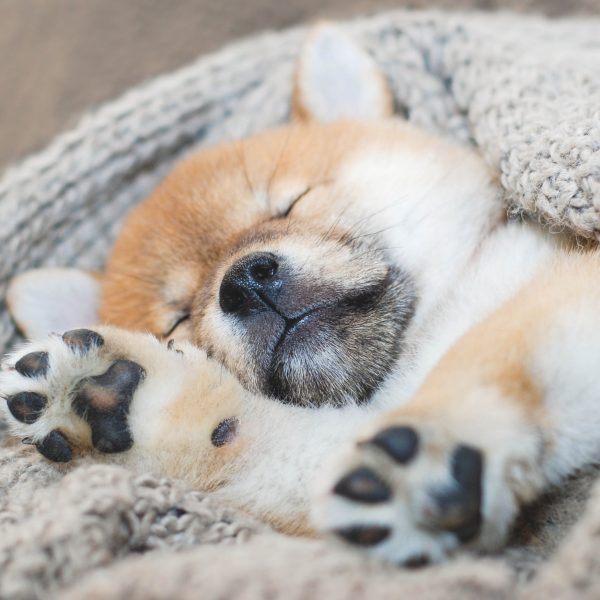Why Do Dogs Sleep So Much?

Dogs tend to sleep more than humans. Even if your dog is a high-energy breed, they probably still sleep more than you do. Why do dogs sleep so much? Here’s what you need to know about how much dogs normally sleep and a few reasons they sleep so much:
How Much Do Dogs Sleep?
Some dog breeds have a higher energy level than others and individual dogs all have their own quirks. On average, dogs spend about 50% of their day sleeping and 30% “resting” where they are awake but are lying around or taking it easy. This usually amounts to 12-14 hours of sleep over a 24-hour period.
Puppies, senior dogs, and giant breeds tend to be on the higher end of the range and sleep more on average. Although some puppies may be in the 12-14 hour range, it’s not uncommon for puppies to need 18-20 hours of sleep. On the other hand, dogs that are busy and have a lot to do, like working dogs or farm dogs, may sleep less on average.
Why Do Dogs Sleep So Much?
Compared to humans, dogs sleep more on average. Why do dogs sleep so much? Here are a few reasons:
1. Dogs Tend to Sleep for Shorter Periods
One of the theories behind why dogs sleep so much is because they sleep for shorter periods and do not tend to sleep as deeply. A dog that is asleep can often wake up ready to go when something interesting is happening.
They are also flexible sleepers and will take a lot of short naps throughout the day instead of fitting most of their sleep into one prolonged period as humans do. Because of this, it’s estimated that dogs only spend about 10% of their sleep time in REM sleep, which is the deep, restorative sleep we all need. As such, they need to sleep more to get enough of it in their day.
2. Your Dog Could Just Need More Sleep
If your dog is a young puppy or a senior dog, they often sleep more than other dogs. Since dogs, in general, tend to sleep more than humans, a puppy or an older dog that needs more sleep seems to spend their entire day sleeping. Enough sleep along with a normal activity level are signs of a healthy puppy and dog.
Although small dogs can also be above-average sleepers, it’s usually the giant breeds that tend to be lower energy and require more sleep. So, whether it’s age-related or size-related or due to something else, your dog could be sleeping a lot because they just need more sleep.
3. They Could be Bored
Dogs that have a lot to do, do not tend to sleep as much on average than dogs that don’t. A farm dog or a police dog that is working a lot throughout the day may not sleep as much as a dog that doesn’t have specific job duties to do.
Although dogs tend to get into mischief when they are bored, another one of the signs your dog is bored is if they are listless or lethargic. This could result in your dog sleeping more than usual. If your dog seems to be sleeping more than usual for them, consider what you’ve been doing with them. You may need to work in some more exercise or playtime to help provide some more mental stimulation in their day.
4. Your Dog Could Have Something Going On
Dogs that are overweight tend to sleep more than dogs that are in a normal weight range for their breed and size. Dogs that are feeling unwell, are depressed, or are sick also tend to sleep more and are notably more lethargic than healthy dogs.
If your dog is sleeping more often than normal, it’s a good idea to make an appointment with your vet to make sure nothing is going on. If you see any other symptoms you should never ignore in your dog, like diarrhea, vomiting, fever, etc, then you should get to the vet sooner rather than later. These symptoms are common to a wide variety of health issues in dogs and your vet can help you figure out what’s going on and help your dog feel better.
These are just a few reasons why dogs sleep so much. Napping around you is a sign your dog is relaxed and is also one of the signs your dog is happy. Dogs sleep a lot more than humans do, on average. It’s usually not a concern unless it changes dramatically for your dog. If your dog is sleeping a lot more or a lot less than is normal for them, even if you don’t see other symptoms, it’s a good idea to visit the vet and make sure things are okay.
